In recent years, the conversation around menstrual products has shifted significantly, with a growing emphasis on health, sustainability, and eco-friendliness. Among the products leading this change are organic pads, which have gained popularity for their promise of being better for both the body and the planet. These pads are made from natural materials, free from chemicals and synthetic fibers, offering a greener alternative to traditional menstrual products.
Organic Pads
Organic pads provide a natural alternative in feminine hygiene products, focusing on the use of materials that are free from chemicals and synthetics. Constructed primarily from cotton, these pads ensure a breathable, soft experience, minimizing the risk of irritations often associated with conventional products. The production of organic pads involves strict standards, including the ban of pesticides and chemical fertilizers in the cotton farming process. This commitment not only supports personal health but also promotes sustainable farming practices. In recognizing the environmental advantage, organic pads typically feature biodegradable components, aiding in waste reduction. Users of organic pads benefit from the peace of mind that comes with knowing their choice supports both their health and the planet’s well-being.
How Organic Pads Compare to Traditional Pads
Organic pads differ significantly from traditional pads in materials, health benefits, and environmental impact. Unlike traditional pads, which often contain plastics, fragrances, and synthetic fibers, organic pads utilize natural cotton, free from pesticides and chemicals. This ensures a reduced risk of skin irritations and allergies, offering a safer option for those with sensitive skin. Furthermore, organic pads support sustainable practices by using biodegradable materials, which leads to less environmental waste compared to the non-biodegradable components found in many traditional pads. In terms of comfort and absorbency, organic pads match traditional pads, providing effective menstrual protection without compromising on health or sustainability. By choosing organic pads, consumers not only prioritize their health but also contribute to reducing the ecological footprint of menstrual products.
Top Brands of Organic Pads
Transitioning from the benefits and health impacts of organic pads, several brands stand out for their commitment to producing high-quality, eco-friendly menstrual products. These brands focus on offering organic pads made from natural materials, ensuring a safer and more comfortable experience for users.
- Natracare: Pioneers in the organic personal care market, Natracare offers certified organic cotton pads designed to be gentle on the skin and the environment. Their products are free from plastics, perfumes, and chlorine.
- Rael: Known for their use of organic cotton sourced from Texas, Rael provides pads that are highly absorbent and hypoallergenic. They emphasize natural, breathable materials for optimal comfort.
- Organyc: Specializing in feminine hygiene, Organyc’s pads are made with 100% certified organic cotton, offering skin-friendly and biodegradable options. They focus on sustainability and transparency in their product line.
- L.: L. features organic pads that are free from chlorine bleaching, synthetic pesticides, and fragrances. They prioritize accessibility, partnering with organizations to make menstrual care available to those in need.

How to Choose the Right Organic Pads for You
Selecting the ideal organic pad involves evaluating several key aspects, aiming to match personal preferences and health needs. Comfort, absorbency levels, and individual eco-conscious goals stand out as primary considerations.
- Assess Material Comfort: Organic pads by brands like Natracare and Rael, crafted from natural cotton, offer superior comfort. Buyers should seek materials that ensure skin breathability to avoid irritation.
- Consider Absorbency Requirements: With offerings from Organyc and L., focusing on varying absorbency levels is crucial. Whether it’s for light days or heavy flow, selecting a pad that provides the needed protection without bulkiness is essential.
- Evaluate Eco-Friendly Credentials: For those prioritizing sustainability, examining a product’s biodegradability and the brand’s commitment to sustainable farming can influence the decision. Brands that boast certifications for organic practices deserve attention.
Care and Disposal of Organic Pads
Switching to organic pads not only benefits personal health and comfort but also contributes to a healthier planet. When it comes to care, these pads are just as easy to use as their non-organic counterparts but with the added peace of mind that comes from knowing they’re free from harsh chemicals. For disposal, most brands offer biodegradable options, making it easier to minimize environmental impact. It’s essential to follow each brand’s guidelines to ensure proper disposal and to continue supporting eco-friendly practices. By choosing organic pads, consumers make a conscious decision towards a more sustainable and health-conscious lifestyle. Remember, every small choice can lead to significant positive changes for both personal health and the environment.

